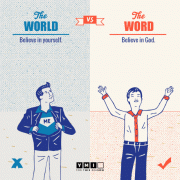When I Got Lost in Different Worldviews
Written by Chronika Febrianti, originally in Bahasa Indonesia
What is your “worldview”? What beliefs and values govern the way you perceive the world around you?
Just like how wearing colored lens will affect how we see things, our worldview will affect how we make sense of the things that happen around us, and determine what stand we take in life. For example, a person who thinks that we only live once (ie. YOLO) will be more likely to go to extreme lengths to fulfil his or her desires without thinking about the long-term consequences.
For me, it wasn’t an easy process trying to determine what my worldview was. It began when I read a book about worldviews, entitled TH1NK series: Worldviews. It summarized the key points about various beliefs and religions around the world, and compared them with the Christian faith. It helped me to see clearly that while there were similarities across different worldviews, there were fundamental differences between the belief systems.
Little did I know that what I had read was merely a peek into the complex world of worldviews. My conviction would be tested to its full extent when I started taking a course in philosophy, as part of my undergraduate studies at the Faculty of Cultural Sciences in the University of Indonesia. It exposed me to different ways of thinking, as well as worldviews such as humanism, feminism, and some eastern philosophy that got me questioning the “lens” I had used since my childhood—that of Christianity.
The more worldviews I came across, the more I kept changing my “lens”, and at the end, I found myself very confused about what I actually believed in. Just like a person who built his house on the sand, my faith was in a state where it could collapse anytime. It didn’t help that I kept all my doubts to myself.
For example, I came to be acquainted with biologist and atheist Richard Dawkins’ idea of “the selfish gene”. Building on Charles Darwin’s theory of evolution, he argued that the genes that get passed down from one generation to the next are those that look out for their own interests. And even in instances where the individual seems to act altruistically, it’s actually because the gene knows that by helping related organisms reproduce, it’s succeeding in making “copies” of itself—so it is essentially still being selfish.
As a result, the Christian teaching of selflessness and love suddenly did not make sense to me. I stopped attending church and lost interest in Christianity, as well as in any religion that advocated love.
One day, however, a friend told me about the life of the apostle Paul, whose example went against “the selfish gene”. Although he knew that spreading the gospel of Jesus would cost him his life, he continued to do so with great fervor. I started to see that the selfish gene theory was not always applicable. It made me even more confused about what to believe in.
But I started to realize that what I had read in the book about worldviews was true. More importantly, I was reminded about the need to pray and fill my mind with God’s Word, as the highest authority in Christian faith. All along, I had been trying to understand Christianity by comparing it with other worldviews, based on my own limited understanding and assumptions. I had never really sought what God had to say about Himself and about His love. No wonder I was confused. If we do not seek the truth from the source of all truth, we can’t claim to live in truth.
Right now, I still have some questions and doubts that I have not found the answers to. But as I continue to read my Bible carefully, God encourages me with His Word: “Keep this Book of the Law always on your lips; meditate on it day and night, so that you may be careful to do everything written in it. Then you will be prosperous and successful. Have I not commanded you? Be strong and courageous. Do not be afraid; do not be discouraged, for the Lord your God will be with you wherever you go” (Joshua 1:8-9).
Are you going through the same thing? If you feel confused by the differences or similarities between religions, here’s my advice: don’t keep your questions and doubts to yourself. Find somebody whom you can talk to (it could be your pastor, spiritual leader, or cell-group leader) to help clarify your thinking. And make sure to consult God himself, the source of Truth. Read His Words, carefully and faithfully.







That line from Joshua, where he mentions “the book of the law,” was referencing the Torah. Jesus had not yet lived and the new testament had not yet been written when God was quoted in Joshua. Every single place in the Bible that refers to “the book” “the law” or “the scriptures,” it is referencing Jewish books, laws, and scriptures. However Christians like to appropriate those quotes to bolster the legitimacy of their own religion.
Can we just acknowledge how confusing Christianity has become. And even when you say you view the world through Christianity’s lenses, it’s quite blurry. Because they’re all these different and opposing opinions that Christians have and they all use the Bible as a basis. It is honestly difficult to know what exactly God’s stance is on several issues.